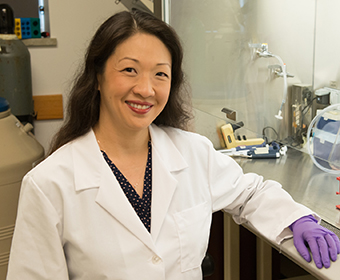
Jenny Hsieh is a nationally recognized researcher who is leading UTSA’s efforts in brain health research.
We hope our research in brain function will impact the lives of patient populations as well as the general public. Our research studies how the brain works and how the brain may change with different genetic disorders, health conditions and the basic human experience of living. Specifically, we hope to increase our understanding of the mechanisms that cause brain disorders, such as childhood epilepsy. By studying these ideas in our laboratory, we can translate basic discoveries into cures and preventative strategies to help improve the lives of people living with different disorders.
What is one major goal you have for your life or your career?
My goal is to be an example and mentor, and my major objective is to train the next the generation of scientists. I especially want to promote, support and advocate for the advancement of women in science.
Have you had any mentors? How do they inform what you do now?
Yes, I have had many mentors throughout my career. I believe solid mentorship is essential for a successful career in scientific discovery, and my mentors today provide a constant source of inspiration and career guidance.
What would you say to a student who is interested in entering your field?
My best advice for someone who is entering this field is to identify the most important problem in the field and to not be afraid of taking risks. Don’t do something because everything else is doing it. Do something truly new. A career in scientific discovery requires a curious, creative mind, and I would encourage new scientists to embrace and trust this creativity.
What do you think the biggest challenge researchers in your field are facing?
The most talked about challenges are funding concerns, and issues with rigor and reproducibility in science. What is less talked about is that science is poorly communicated. To improve science communication, being able to explain your work to a non-scientific audience is just as important as publishing in a peer-reviewed journal. But this skill is under-rewarded in the current system. Another challenge is the incredibly stressful life of a Ph.D. or postdoc. I believe we need to focus on supporting a work/life balance to cultivate successes in the laboratory. For example, family leave policies and child care solutions can help support the next generation of researchers.
What is the most important thing going on in your field that no one is talking about?
One idea that isn’t discussed too often is the regulations and laws behind research with human subjects. Right now, Congress is working to change these laws in the favor of scientists to decrease administrative burdens for collecting patient information and patient samples, which I believe would increase research activity.
Specifically, the regulations for biobanks of human biospecimens is under review. If this is approved, patients would be able to donate their information and biosamples to large research systems and biobanks in a more streamlined, highly ethical way. We will see if these new regulations go into effect in July of this year.
Do you have a favorite quote?
“Life is not easy for any of us. But what of that? We must have perseverance and above all confidence in ourselves.” -- Marie Curie
Connect with UTSA online at Facebook, Twitter, YouTube, Instagram and LinkedIn.
UTSA Today is produced by University Communications and Marketing, the official news source of The University of Texas at San Antonio. Send your feedback to news@utsa.edu. Keep up-to-date on UTSA news by visiting UTSA Today. Connect with UTSA online at Facebook, Twitter, Youtube and Instagram.
Huddle Against Hunger is a fundraising competition with Texas State that benefits our Roadrunner Pantry. Donations this week will help UTSA earn additional prize monies provided by RBFCU.
In-Person and VirtualJoin UTSA Libraries for an update on federal public access policies and how the library can assist with compliance.
Virtual EventWe invite you to join us for Birds Up! Downtown, an exciting welcome back event designed to connect students with the different departments at the Downtown Campus. Students will have the opportunity to learn about some of the departments on campus, gain access to different resources, and collect some giveaways!
Bill Miller PlazaThere are many citation managers. Which one is right for you? This workshop will explain what a citation manager is and how it can help you organize your citations, insert citations as you write your paper, and generate your bibliography.
Virtual EventPubMed is an essential database for anyone conducting biomedical or health-related research. This workshop will teach attendees how to effectively navigate this free resource and locate peer-reviewed articles using advanced search features, MeSH subject headings, and Boolean operators.
Virtual EventIn this hands-on workshop, participants will learn to setup an EndNote library, save references and PDFs, and automatically create and edit a bibliography. Attendees are encouraged, but not required, to have EndNote already installed on a personal computer.
Virtual EventJoin UTSA Libraries and Museums to learn more about the publishing discounts available for UTSA researchers. Current agreements include Elsevier, Cambridge University Press, Wiley, and more. Bring your questions and feedback for the library as we continue to pursue partnerships with publishers to reduce costs for our researchers.
Virtual EventThe University of Texas at San Antonio is dedicated to the advancement of knowledge through research and discovery, teaching and learning, community engagement and public service. As an institution of access and excellence, UTSA embraces multicultural traditions and serves as a center for intellectual and creative resources as well as a catalyst for socioeconomic development and the commercialization of intellectual property - for Texas, the nation and the world.
To be a premier public research university, providing access to educational excellence and preparing citizen leaders for the global environment.
We encourage an environment of dialogue and discovery, where integrity, excellence, respect, collaboration and innovation are fostered.